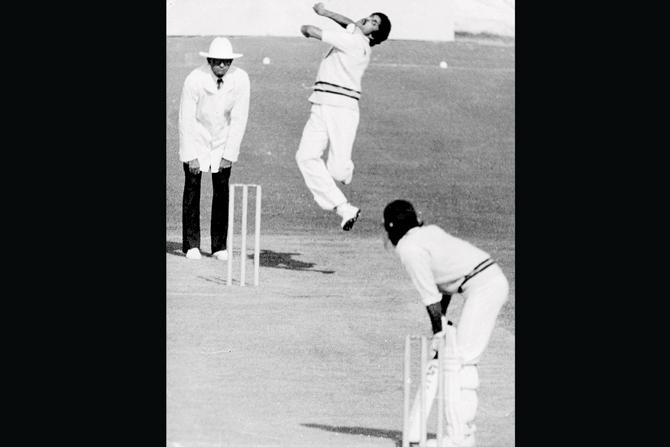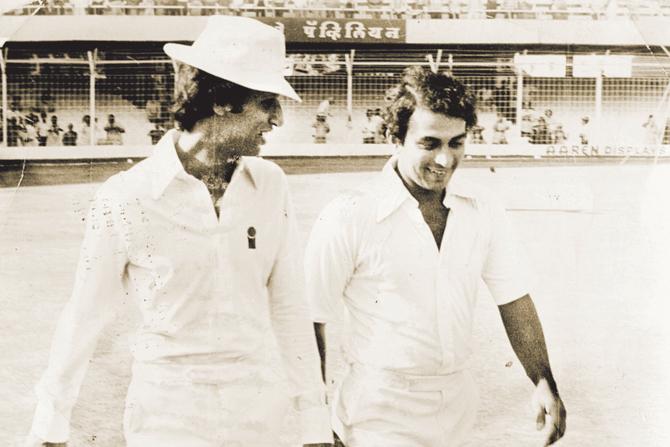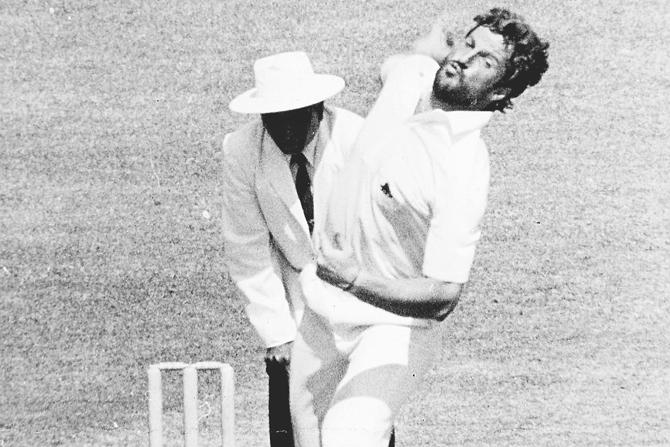This week marked 40 years for the end of Indian cricket's busy season that witnessed 3 visiting teams - Australia, Pakistan and England - across 13 Tests

Imran Khan and Kim Hughes. Pics/ mid-day Archives
A significant fallout of Team India's twin triumphs of 1971 was an increase in the volume of international cricket. Starting 1974-75, India played at least one Test series, either at home or away, every season. The 1979-80 season marked the culmination of this upsurge. India's most hectic home season till that point witnessed as many as 13 Test matches, split between three touring sides.
For the Indian players, the 1979-80 season was an extension of the previous one. A historic tour of Pakistan had been followed by a six-Test series at home against the West Indies, after which the team flew to England for the second World Cup and a four-Test tussle. In fact, the Indian team was still in England when Kim Hughes's Australians arrived for a six-Test contest in August 1979. Kerry Packer's World Series Cricket, which had run parallel to 'establishment' cricket for two seasons, had been disbanded by then, but the Australian selectors still chose not to pick the cricketers who had been a part of WSC.
ADVERTISEMENT
The captaincy of the Indian team changed hands for the Australia series. S Venkataraghavan, India's captain in England, heard about his sacking on the flight back home. Sunil Gavaskar's XI for the first Test at Chennai comprised Dilip Doshi, the 31-year-old left-arm spinner from Bengal. He made an impressive debut, with match figures of 8-167. Their inexperience notwithstanding, the Australians gave a good account of themselves in the first two Tests, before losing by 153 runs in the third Test at Kanpur. India's most successful bowler was the two-Test old Shivlal Yadav, with match figures of 6-100. Australia achieved an honourable draw in the next Test at Delhi, scoring 413 after being asked to follow-on, 212 runs in arrears. India had three centurions in their only innings—Gavaskar, Gundappa Viswanath and Yashpal Sharma.
 Kapil Dev bowls to Pakistan's Wasim Raja in the 1979-80 home series
Kapil Dev bowls to Pakistan's Wasim Raja in the 1979-80 home series
Australia took a first-innings lead of 95 in the fifth Test at Kolkata. Set a target of 247, India reached 200-4 before the game was called off. The final Test at Mumbai was one-sided, with India winning by an innings and 100 runs. Gavaskar scored his second century of the series and Syed Kirmani, his first in Tests. Australia lost the series, but they had plenty to be happy about. Hughes led from the front with an aggregate of 594 runs, the highest on either side. Second in the table was Allan Border, a future leader, with 521 runs, three more than Viswanath, who was India's highest scorer.
Star-studded Pakistanis
Even as the Australia series was winding up, the nation's attention had shifted to Asif Iqbal's star-studded Pakistanis. A conspicuous absentee was paceman Sarfaraz Nawaz, who had withdrawn from the tour. Gavaskar's statement—"Pakistan would smash India to pulp"—did nothing to dispel the pessimism of India's cricket lovers. However, the hosts had the last laugh. The first Test at Bangalore was drawn. Pakistan gained control of the second Test at Delhi by bowling India out for 126 in the first innings. However, India came back strongly in the second innings, scoring 364-6 in pursuit of a target of 390. India's hero was Dilip Vengsarkar, who scored an unbeaten 146.
Gavaskar's mind games had a direct bearing on the outcome of the third Test at Mumbai; irritated with Kapil Dev's penchant for throwing his wicket away when set, the captain declared publicly that the all-rounder would never score a fifty again. An upset Kapil Dev put his head down to score 69 on a turner, a knock which contributed to India's 131-run win.
 Pakistan captain Asif Iqbal (left) and Sunil Gavaskar at Wankhede
Pakistan captain Asif Iqbal (left) and Sunil Gavaskar at Wankhede
Pakistan took the first-innings lead in the next Test at Kanpur but India drew the game comfortably. A combination of shoddy batting, the all-round brilliance of Kapil and the genius of Gavaskar cost the visitors the fifth Test at Chennai. Gavaskar's 166 and Kapil's 84 and 11-146 set up a 10-wicket victory. Pakistan's top performer in the game was Imran Khan, who took five wickets after recovering from a back injury. There was no doubt that his inability to bowl at his best earlier in the series had adversely affected Pakistan's prospects.
The news of the series win had barely sunk in when Gavaskar announced his abdication as captain, citing his unavailability for a proposed tour of the West Indies. That tour was eventually cancelled, much to the relief of the Indian players who were exhausted after nearly two years of incessant cricket but a new captain had to be appointed. Gundappa Viswanath was entrusted the reins for the last two Tests of the season.
That was strange
The drawn final Test of the Pakistan series, played at Kolkata, came to be a source of fodder for gossip columns in the years to come. There were those who suspected 'foul play' at the toss and questioned Pakistan's decision to declare their first innings despite not having taken the lead.
 Jubilee Test hero Ian Botham in full flow
Jubilee Test hero Ian Botham in full flow
The end of the season was anti-climactic for the Indian team. Cricketing stalwarts of the past and present and their administrative counterparts congregated at the Wankhede Stadium for the Jubilee Test match against an England side on its way home from Australia. The talking point of the game, which had been organised to commemorate the golden jubilee of the BCCI, was Viswanath recalling Bob Taylor to the crease after the latter had been declared out, caught at the wicket off Kapil. The Indian captain reckoned that the batsman was not out and therefore withdrew the appeal. His magnanimity was forgotten when England won by 10 wickets. The Indians ended up being overly generous hosts and dished out a wicket which was straight out of the visitors' dreams. Ian Terence Botham scored 114 and took 13-106, thus becoming the first cricketer to score a century and take over 10 wickets in the same Test.
India's biggest gain from the marathon season was a player who became one of Botham's fiercest rivals. Kapil's performances with the bat and ball in only his second season of international cricket earned him a place in the pantheon of all-time greats.
Top numbers in 1979-80
8-167
Left-arm spinner Dilip Doshi's figures on Test debut against Australia in Chennai
594
Australia batsman Kim Hughes's aggregate in the six-Test series against India—the highest on either side
146*
Dilip Vengsarkar's unbeaten knock that helped India draw the second Test against arch-rivals Pakistan in Delhi
Catch up on all the latest sports news and updates here. Also download the new mid-day Android and iOS apps to get latest updates
 Subscribe today by clicking the link and stay updated with the latest news!" Click here!
Subscribe today by clicking the link and stay updated with the latest news!" Click here!







